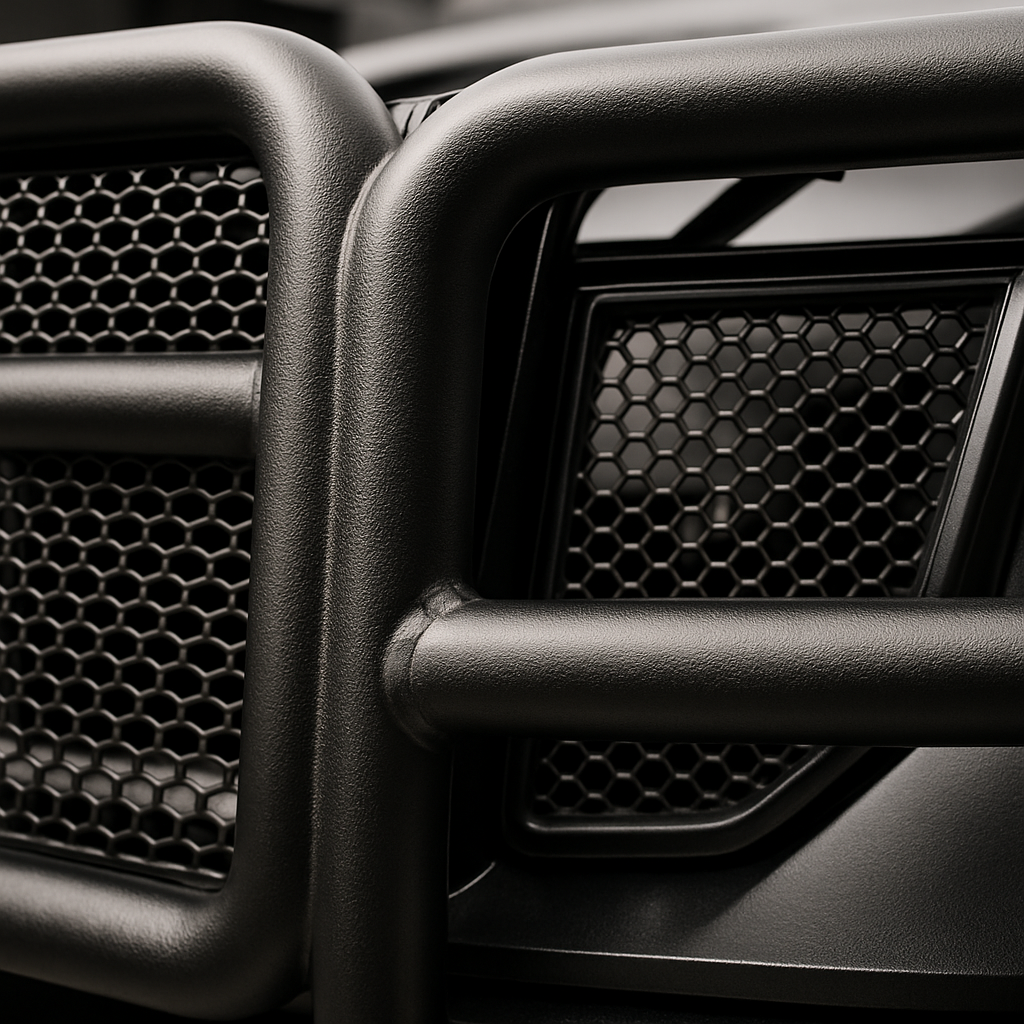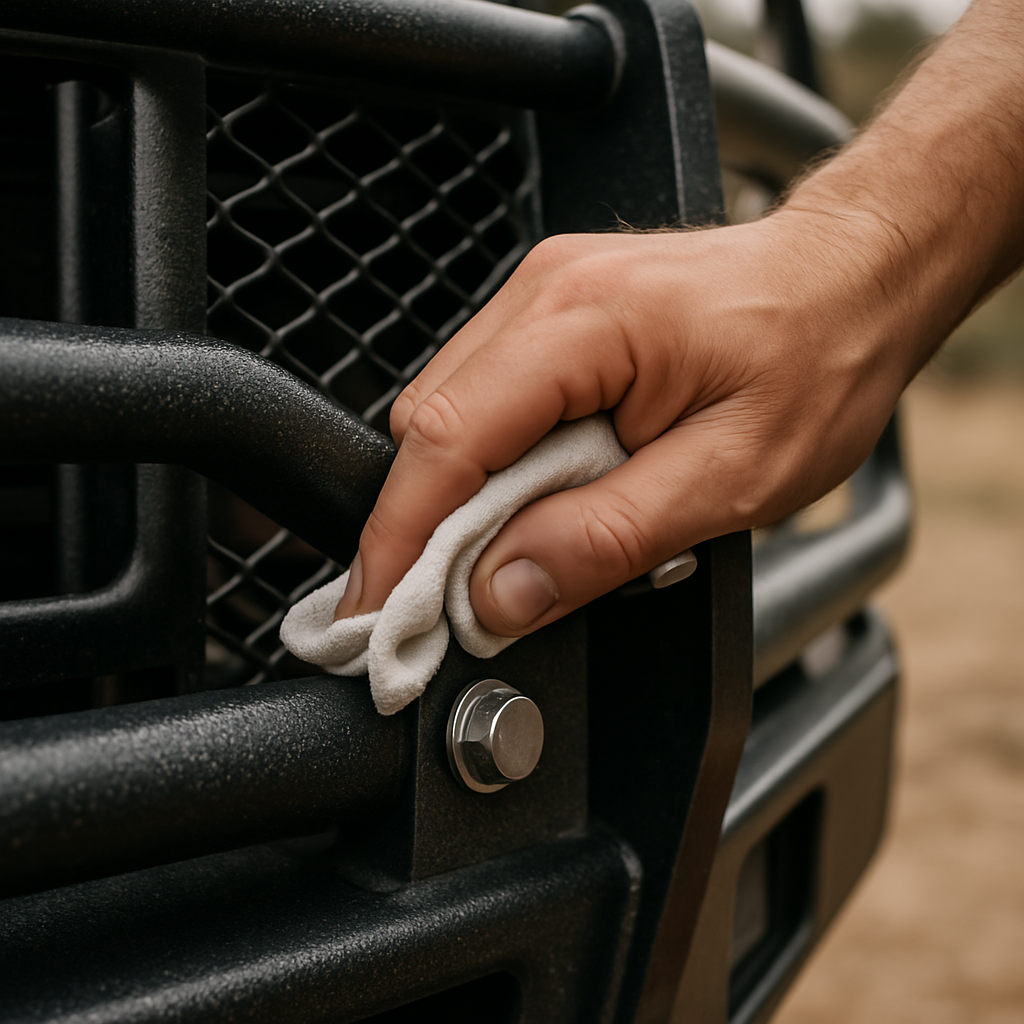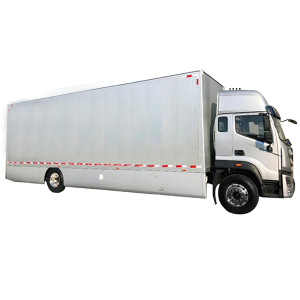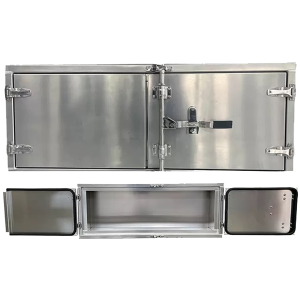In the demanding world of heavy-duty trucking, your semi-trucks and trailers are vital assets. They face constant threats from debris, animal collisions, and minor accidents, leading to costly repairs and downtime. How can you effectively protect your investment and ensure driver safety? A Heavy-Duty Custom Grill Guard for Semi Trucks & Trailers is engineered for superior frontal protection, significantly extending vehicle lifespan and ensuring operational continuity. With our expertise in vehicle protection, we understand the importance of selecting the right defense for your fleet, ensuring long-term value and peace of mind. Are you looking for a reliable solution to safeguard your fleet assets? This article provides comprehensive guidance on custom grill guards, from material selection to installation and maintenance, helping you make an informed purchasing decision.

1. Why Do You Need a Custom Heavy-Duty Grill Guard?
A custom heavy-duty grill guard is an essential part of your vehicle’s operational strategy. Why is this investment crucial?
Firstly, it protects the front of your vehicle from impacts and damage. At highway speeds, debris or animal encounters can severely damage radiators, headlights, and engines. A robust Heavy-Duty Custom Grill Guard for Semi Trucks & Trailers absorbs and disperses these impacts, preventing costly repairs and minimizing downtime. For instance, animal collisions annually cause substantial damage to heavy trucks, leading to thousands in repair costs and significant economic losses. Grill guards also resist road debris and protect against harsh weather (blizzards, dust storms) and complex terrains (branches, rocks), preserving vehicle integrity.
Secondly, installing a grill guard significantly extends the vehicle’s lifespan. By reducing wear and tear on front-end components, core systems remain functional longer, leading to fewer breakdowns, lower maintenance, and higher resale value. For B2B buyers, this translates to a better Return on Investment (ROI) and a lower Total Cost of Ownership (TCO). A logistics company, after installing Heavy-Duty Custom Grill Guards for Semi Trucks & Trailers, observed a 30% reduction in front-end component replacement, saving substantial annual repair expenses and increasing vehicle resale value. This ensures vehicles remain operational longer, maximizing profitability. Grill guards also protect cooling systems and engines, reducing expensive engine repair costs.
Moreover, a Heavy-Duty Custom Grill Guard for Semi Trucks & Trailers enhances driver and passenger safety. In a frontal collision, it provides additional cushioning, reducing cab deformation and maximizing occupant safety—a critical consideration for businesses prioritizing employee safety. Reduced repair costs and downtime are direct economic benefits; a grill guard ensures continuous and efficient fleet operation. In extreme cases, it can prevent animals from directly hitting the cab, providing drivers precious reaction time. For vehicles transporting hazardous materials or operating in remote areas, this added safety is particularly important, offering a safer escape space. Grill guards also reduce driver stress from vehicle damage, improving driving safety.
Finally, a custom grill guard enhances the vehicle’s appearance and professional image. A well-designed, sturdy Heavy-Duty Custom Grill Guard for Semi Trucks & Trailers makes a semi-truck look more powerful and professional, positively impacting corporate brand image and customer trust. In a competitive market, details often determine success. It’s not just a functional protective device but a visual statement of your fleet’s commitment to safety, efficiency, and professionalism, attracting new clients and maintaining existing relationships. Many businesses engrave company logos, strengthening their brand and turning vehicles into mobile billboards. Consistent vehicle appearance also boosts team cohesion and corporate culture.
| Grill Guard Advantage | Specific Benefit | Purchasing Manager Focus |
|—|—|—|—|
| Vehicle Protection | Reduces collision damage, protects critical components, resists road debris | Lowers repair costs, extends asset life, reduces accident risk |
| Extended Lifespan | Reduces wear, maintains good operating condition, increases vehicle resale value | Improves ROI, lowers TCO, maximizes profitability |
| Enhanced Safety | Provides extra cushioning, protects cab, reduces injury risk | Employee safety, corporate social responsibility, reduces legal risks |
| Reduced Downtime | Lowers breakdown rate, ensures operational continuity, reduces indirect losses | Improves operational efficiency, secures revenue, enhances customer satisfaction |
| Improved Image | Enhances professional appearance, boosts brand value, attracts new clients | Market competitiveness, customer trust, brand building |
2. What Key Materials Are Used in Custom Grill Guards?
Material choice is critical for a custom grill guard’s performance, durability, and cost. What are the main materials available? Understanding their properties helps you make the best decision for your fleet. Which material is best for your fleet?
Stainless Steel: Popular for Heavy-Duty Custom Grill Guards for Semi Trucks & Trailers due to excellent corrosion resistance, high strength, and bright appearance. It performs well in humid or salty environments, resisting rust and maintaining luster. Though expensive, its durability and low maintenance make it ideal for B2B buyers, especially for fleets in coastal regions. Stainless steel has a high surface finish, is easy to clean, and provides strong structural support in collisions. Common types include 304 and 316 (for stronger chloride corrosion resistance). It maintains properties at extreme temperatures and offers excellent weldability.
Aluminum Alloy: Offers lightweight properties, reducing overall vehicle weight and potentially improving fuel efficiency. It provides good corrosion resistance, though less than stainless steel. Ideal for fleets with strict self-weight requirements or those optimizing fuel consumption. A logistics company using aluminum alloy Heavy-Duty Custom Grill Guards for Semi Trucks & Trailers for long-haul fleets saw significant fuel cost reductions. Its workability allows for aerodynamic designs. High-strength aerospace-grade alloys (e.g., 6061, 7075 series) are used. Aluminum alloy is recyclable, aligning with environmental goals. Despite slightly lower tensile strength than steel, its energy absorption performs well in collisions.
Carbon Steel: A cost-effective material for Heavy-Duty Custom Grill Guards for Semi Trucks & Trailers, offering good strength. It’s easy to work with and can be formed into various shapes. However, it’s prone to rust without proper surface treatment. High-quality carbon steel grill guards undergo multi-layer anti-corrosion treatments (e.g., electrophoretic coating, powder coating) for harsh environments. It balances cost and performance for businesses with budget constraints. Its strength and impact resistance make it suitable for heavy impacts. Hot-dip galvanizing can further enhance durability. For extreme impact resistance, like in mining or construction, carbon steel is favored for its deformation resistance and ability to absorb impact energy.
Surface Treatment: Essential for enhancing durability and aesthetics. Common treatments include:
- Powder Coating: Provides a tough, scratch-resistant, corrosion-preventing layer with various color options. Offers excellent adhesion, weather resistance, and resists chips, chemicals, and UV radiation. Customizable to match corporate brand colors, it’s also eco-friendly.
- Chrome Plating: Gives a mirror-like finish, good corrosion resistance, and enhances visual appeal. Adds hardness and wear resistance. Requires regular maintenance.
- Polishing: Used for stainless steel and aluminum alloy, creating a smooth, bright surface. Easier to clean and resists minor corrosion, showcasing the material’s texture. Removes surface oxidation.
- Electrophoretic Coating (E-coating): Advanced coating technology for uniform, dense, strongly adhesive film. Offers excellent corrosion resistance and weatherability, especially for complex shapes. Typically used as a primer.
- Hot-Dip Galvanizing: Immersing steel in molten zinc forms a protective layer. Offers superior corrosion resistance, especially in outdoor and humid environments. Significantly extends lifespan.
| Material Type | Pros | Cons | Applicable Scenarios |
|---|---|---|---|
| Stainless Steel | Excellent corrosion resistance, high strength, bright appearance, low maintenance | Higher cost, heavier weight, slight impact on fuel efficiency | Humid, salty environments, ultimate durability and aesthetics |
| Aluminum Alloy | Lightweight, good corrosion resistance, fuel efficiency potential, flexible design | Slightly lower strength than stainless steel, moderate cost | Weight requirements, fuel optimization, lightweight and aerodynamics |
| Carbon Steel | High cost-effectiveness, good strength, easy to process | Prone to rust (requires surface treatment), heavier weight | Budget constraints, robust protection with anti-corrosion treatment |

When choosing materials, consider your operating environment, budget, and vehicle performance requirements. Different materials directly impact performance and Total Cost of Ownership. Clearly explain your operational needs to suppliers for professional advice. Understanding lifecycle cost is crucial for B2B decisions. Also, consider environmental properties.
3. How to Choose the Right Grill Guard Design?
Choosing a custom grill guard design is like tailoring protective armor. Different designs suit various protection needs and operational scenarios. How do you make the best choice? Understanding each design’s characteristics helps you find the ideal Heavy-Duty Custom Grill Guard for Semi Trucks & Trailers for your fleet. Which design aligns best with your operational model?
Full-Wrap Grill Guards: Offer maximum protection, covering the entire front (radiator, headlights, bumper). They excel in high-speed collisions or large obstacles, minimizing damage. Ideal for heavy-duty trucks in complex road conditions or off-road environments (e.g., forestry, mining). If vehicle safety is top priority, this design is best. They usually have multi-point attachments for sturdiness and integrate with vehicle lines for aesthetics. Some advanced designs include extra lighting, tow hooks, or winch mounting points. Aerodynamic performance is considered to minimize fuel efficiency impact.
Push Bar Grill Guards: Feature a front bar for pushing or connecting to trailers, practical for frequent towing or maneuvering in confined spaces. They offer protection while providing operational convenience, improving efficiency in construction sites or logistics centers. Generally lighter and easier to install than full-wrap guards, they suit urban delivery or short-haul transport. Some are foldable or detachable. Consider the push bar’s strength and connection method, and customize its length and angle for optimal operability and safety.
Modular Grill Guards: Composed of independent sections, simplifying installation and maintenance. Damaged components can be replaced individually, reducing repair costs and downtime. Ideal for fleets needing quick turnaround. This design offers customization flexibility and is suitable for vehicles in urban traffic where minor collisions are common. Modular guards are also convenient for transportation and storage.
Customized Designs: Many manufacturers offer highly customized services, allowing unique Heavy-Duty Custom Grill Guard for Semi Trucks & Trailers designs based on specific vehicle models, operational needs, or brand image. This includes adjusting size, shape, material, and features (lighting, winch points, sensor mounts, logos). Do you want your fleet to stand out? Customized designs meet personalized needs, perfectly integrating with your vehicle, enhancing aesthetics and functionality. Invaluable for businesses with special models, extreme environments, or strong brand image goals. Professional engineering teams ensure designs meet functional requirements and safety standards.
When choosing a grill guard design, also consider:
- Vehicle Model and Compatibility: Ensure full compatibility to avoid installation issues. Manufacturers provide compatibility lists or custom measurement services. Incompatible guards can cause damage or fail to protect.
- Operating Environment and Risk Assessment: Vehicle’s primary use determines required protection. Assess potential risks (wildlife, rugged terrain) to choose appropriate protection.
- Regulations and Standards: Ensure compliance with local laws for modifications, length, width, and light positioning. Professional suppliers are usually aware.
- Aesthetics and Brand Image: Design impacts vehicle appearance and corporate brand. Choose a design aligning with your fleet’s style to enhance professionalism. Suppliers offer color, surface treatment, and custom logo options.
- Budget and Return on Investment: Consider initial cost, installation, maintenance, and long-term benefits. Select a design within budget that offers the best ROI. Higher initial investment can lead to lower TCO.
| Grill Guard Design | Key Features | Applicable Scenarios | Advantages |
|---|---|---|---|
| Full-Wrap | Maximum protection, covers entire front, sturdy structure | Complex road conditions, high-risk collision environments, off-road operations | Ultimate protection, reduces vehicle damage, enhances driver safety |
| Push Bar | Features a push bar, convenient for towing and moving | Frequent towing operations, confined space maneuvers, logistics centers | Improves operational efficiency, balances protection and convenience |
| Modular | Modular design, easy to install and maintain, components replaceable | Quick turnaround, repair convenience, budget control | Reduces repair costs, minimizes downtime, flexible maintenance |
| Customized | Tailored to needs, highly personalized, integrated functions | Specific vehicle models, special operational needs, brand image building | Meets personalized needs, enhances brand value and functionality |
Choosing the right design is critical for your Heavy-Duty Custom Grill Guard for Semi Trucks & Trailers to provide maximum effectiveness. Assess your needs and communicate with suppliers for the ideal solution. A good design offers superior protection and enhances overall vehicle value and operational efficiency. Consider long-term maintainability and upgrade potential.
4. What Is the Installation Process for a Custom Grill Guard?
Installing a Heavy-Duty Custom Grill Guard for Semi Trucks & Trailers requires precision, directly impacting its protective effectiveness and vehicle safety. What specific steps does this process involve? Understanding installation helps assess complexity and decide on professional vs. DIY. Are you ready for this challenge?
Prepare Tools and Equipment: Gather all necessary tools (wrenches, torque wrench, jack, safety stands) and personal protective equipment. Read the manufacturer’s manual carefully. Incorrect tightening can lead to loosening or detachment. Ensure a well-lit, level work area. For complex installations, professional lifting equipment may be needed. Clean the vehicle surface before installation.
Remove Original Components: You may need to remove factory bumper, fog lights, or tow hooks. Handle carefully to avoid damaging wires and sensors. Minor modifications like drilling might be necessary. Always follow the manufacturer’s instructions.
Mount the Grill Guard: Align the grill guard with the vehicle’s frame or bumper mounting points. Secure it using the provided hardware (bolts, nuts, washers). Ensure all connections are tight and secure. Use a torque wrench to achieve specified torque values. Improper installation can compromise safety and effectiveness.
Connect Electrical Components (if applicable): If the grill guard includes lights or other electrical features, connect them to the vehicle’s electrical system. Ensure all wiring is properly routed and secured to prevent chafing or damage. Test all electrical components before finalizing installation.
Final Inspection: After installation, perform a thorough inspection. Check all bolts and connections for tightness. Ensure the grill guard is properly aligned and does not obstruct lights or sensors. Test all vehicle functions (lights, horn, sensors) to ensure they operate correctly. A professional inspection is recommended for optimal safety and performance.

5. What Are the Maintenance and Care Tips for Custom Grill Guards?
Even the most robust Heavy-Duty Custom Grill Guard for Semi Trucks & Trailers requires regular maintenance to ensure its longevity and effectiveness. How can you maximize its lifespan and maintain its appearance? Proper care extends its protective capabilities and preserves your investment. Are you following best practices for maintenance?
Regular Cleaning: Clean the grill guard regularly to remove dirt, grime, salt, and road chemicals. Use mild soap and water, and avoid abrasive cleaners that can damage the finish. For stainless steel or chrome-plated guards, use specialized cleaners to maintain their luster. Regular cleaning prevents corrosion and keeps the guard looking new.
Inspect for Damage: Periodically inspect the grill guard for any signs of damage, such as dents, scratches, cracks, or loose components. Small damages can worsen over time, compromising the guard’s integrity. Address any issues promptly to prevent further deterioration.
Check Mounting Hardware: Regularly check all bolts, nuts, and mounting brackets for tightness. Vibrations and impacts during operation can loosen hardware. Tighten any loose components to ensure the grill guard remains securely attached to the vehicle. Loose hardware can lead to rattling, reduced protection, or even detachment.
Rust and Corrosion Prevention: For carbon steel grill guards, ensure the anti-corrosion coating is intact. If you notice any chips or scratches in the coating, touch them up promptly to prevent rust from spreading. For stainless steel and aluminum, while more resistant, occasional waxing or polishing can add an extra layer of protection and maintain their appearance.
Professional Servicing: Consider professional servicing for your grill guard, especially after a significant impact or if you notice any unusual issues. Professionals can identify and address problems that might not be obvious to the untrained eye, ensuring the grill guard continues to provide optimal protection.
By following these maintenance tips, you can significantly extend the life of your Heavy-Duty Custom Grill Guard for Semi Trucks & Trailers, ensuring it continues to provide reliable protection and maintain its aesthetic appeal.
6. How Does a Custom Grill Guard Affect Vehicle Performance?
Installing a Heavy-Duty Custom Grill Guard for Semi Trucks & Trailers can influence various aspects of vehicle performance. What are these impacts, and how can they be managed? Understanding these effects helps you make informed decisions and optimize your fleet’s operation. Are you aware of all potential performance changes?
Weight and Fuel Efficiency: Grill guards add weight to the front of the vehicle. While modern designs aim to minimize this, heavier materials like stainless steel can slightly impact fuel efficiency. This is a critical consideration for long-haul fleets where every percentage point of fuel saving matters. Lightweight aluminum alloy guards are often chosen to mitigate this. The impact is generally minor compared to the benefits of protection, but it’s worth noting for fleet managers focused on operational costs.
Aerodynamics: A grill guard can alter the vehicle’s aerodynamics, potentially increasing drag. Manufacturers often design custom grill guards with aerodynamic considerations to minimize this effect, incorporating features like streamlined tubing and integrated designs. The impact on aerodynamics is usually more pronounced at higher speeds. For fleets operating primarily on highways, an aerodynamically optimized design is beneficial.
Vehicle Handling and Suspension: The added weight on the front axle can slightly affect vehicle handling and suspension. This might lead to a minor change in steering feel or require slight adjustments to suspension settings for optimal performance. High-quality custom grill guards are designed to distribute weight evenly and integrate seamlessly with the vehicle’s existing structure to minimize these effects. For heavy-duty trucks, the robust suspension systems are generally well-equipped to handle the additional load.
Sensor and Camera Interference: Modern semi-trucks are equipped with various sensors and cameras for safety features like adaptive cruise control, lane departure warning, and automatic emergency braking. A poorly designed or installed grill guard can obstruct these sensors or cameras, leading to malfunctions. It is crucial to choose a Heavy-Duty Custom Grill Guard for Semi Trucks & Trailers that is specifically designed to accommodate these systems, ensuring they remain fully functional. Many custom grill guards feature cutouts or mounting points for sensors and cameras.
Cooling System Performance: While grill guards protect the radiator, some designs might restrict airflow to the cooling system if not properly engineered. This can potentially lead to overheating, especially in demanding conditions or hot climates. Reputable manufacturers design their grill guards to ensure adequate airflow, preventing any adverse impact on the cooling system. Proper design ensures protection without compromising engine cooling efficiency.
By carefully selecting a Heavy-Duty Custom Grill Guard for Semi Trucks & Trailers that considers these performance aspects, you can ensure that the benefits of enhanced protection outweigh any potential drawbacks, leading to a safer, more efficient, and more durable fleet.
Conclusion
Through this in-depth exploration, we trust you now have a comprehensive understanding of selecting, installing, and maintaining a Heavy-Duty Custom Grill Guard for Semi Trucks & Trailers. This investment is not merely about protecting your vehicle; it’s about safeguarding your operational efficiency, ensuring driver safety, and enhancing your brand’s professional image. By choosing the right materials, design, and ensuring proper installation and maintenance, you can significantly extend the lifespan of your fleet and reduce costly downtime. Make an informed decision to protect your valuable assets and secure your business’s future in the demanding world of heavy-duty transportation.
FAQ Section
Q1: How much does a custom heavy-duty grill guard typically cost?
The cost of a custom heavy-duty grill guard varies widely based on material, design complexity, and customization options. Stainless steel and full-wrap designs are generally more expensive, ranging from $1,000 to $5,000 or more. Carbon steel options with basic designs can be more budget-friendly. Installation costs may be separate. It’s crucial to consider the long-term ROI from reduced repairs and extended vehicle lifespan.
Q2: Can a grill guard interfere with a truck’s airbags?
Modern grill guards are designed to be compatible with vehicle safety systems, including airbags. Reputable manufacturers ensure their products do not interfere with airbag deployment. However, improper installation or using a non-compatible grill guard can potentially affect sensor performance. Always choose products from trusted suppliers and ensure professional installation.
Q3: How long does it take to install a custom grill guard?
The installation time for a custom grill guard can vary from a few hours to a full day, depending on the complexity of the design, the vehicle model, and whether any original components need to be removed or modified. Professional installers can typically complete the job more efficiently. Customized designs or those requiring electrical connections might take longer.
Q4: Are there any legal restrictions on using grill guards?
Legal restrictions on grill guards vary by region and country. Some jurisdictions may have regulations regarding the overall length of the vehicle with the grill guard installed, or restrictions on sharp edges or protrusions. It’s essential to check local and national regulations before purchasing and installing a grill guard to ensure compliance.
Q5: How often should I inspect my grill guard for maintenance?
It is recommended to inspect your grill guard regularly, ideally during routine vehicle maintenance checks or at least once a month. Pay close attention to mounting hardware, signs of damage, and the integrity of any protective coatings. Promptly address any issues to ensure the grill guard continues to provide optimal protection.



